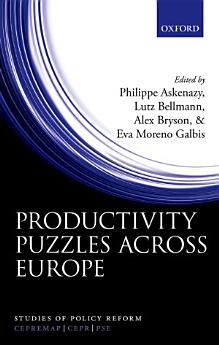Productivity Puzzles Across Europe
Philippe Askenazy · Lutz Bellmann · Alex Bryson · Eva Moreno Galbis
Sep 2016 · Oxford University Press
Ebook
336
Pages
family_home
Eligible
info
reportRatings and reviews aren’t verified Learn More
About this ebook
The 2008 financial crisis put an end to an era of sustained economic growth in Europe. The size of the shock differed across European countries and affected economies in different ways. Yet despite this heterogeneity, most European countries suffered a prolonged period of economic slowdown which raised concerns about the risk of a secular stagnation in Europe. This book focuses on labour productivity in Europe, one of the main drivers of growth and prosperity. Although productivity trends became the focus of policy interest in the immediate aftermath of the recession in the UK, 'productivity puzzles' received much less attention in the rest of Europe. These 'puzzles', which are apparent to greater or lesser extents in most European economies, centre on the marked decline in labour productivity growth which occurred with the on-set of recession. They are puzzles because, in neo-classical economics, firms respond to demand shocks by laying off workers, thus maintaining labour productivity and limiting growth in unit labour costs. Yet this didn't happen in this recession - at least, not to the same extent as in previous recessions, except in Spain. This book brings together contributions from leading European economists who analyse production models and macroeconomic policies, with specific focus on European countries that represent around 60% of the EU GDP. Chapters on France, Germany, the UK, and Spain provide new evidences at the firm/workplace level, and stress the role of transitory labour market mechanisms
About the author
Philippe Askenazy is senior researcher at the French National Center for Scientific Research (CNRS-Paris School of Economics) and Professor of Economics at the Ecole Normale Supérieure. He is also a research fellow of the IZA (Bonn). He received his PhD in political economics from the Ecole des Hautes Etudes en Sciences Sociales (EHESS) and was deputy-director of Cepremap. His main research interests focus on growth, labour, and firm performances. They include theoretical and empirical studies on organizational and technical changes, occupational health and safety, R&D, and innovation. Lutz Bellmann studied economics at the University of Hannover where he received his diploma in 1980. In 1985 he obtained his doctoral degree. From 1980 to 1988 he was research assistant at the Institute for Statistics and Econometrics at the University of Hannover, and from 1988 to 1997 he was research officer at the Institute for Employment Research, Nuremberg. Since 1997 he has been Head of both the IAB Establishment Project and the Department for Establishments and Employment. He is also Chair of Labor Economics at the University of Erlangen-Nuremberg and has lectured at the Universities of Bamberg, Basel, Nuremberg, Passau, Speyer, Trier, Tübingen, and Würzburg. He completed his postdoctoral habilitation in 2003. Alex Bryson is Professor of Quantitative Social Science at UCL's Department of Social Science. He is also a Visiting Research Fellow at IZA, Rutgers, and at the National Institute of Economic and Social Research where he was previously Head of the Employment Group. Prior to that he was Research Director at the Policy Studies Institute where he has worked for nineteen years. His research focuses on employment relations, labour economics, and programme evaluation. Eva Moreno Galbis graduated in economics at the University of Valencia where she received the Award of Academic Excellence. She obtained her Master's Degree and her PhD at the Catholic University of Louvain. In September 2005 she joined the University of Maine as an assistant professor and in 2010 she became full professor at the University of Angers. She is a research fellow at IRES (Institut de Recherches Economiques et Sociales, Catholic University of Louvain) and at CREST (Centre de Recherche en Économie et Statistique, Paris).
Rate this ebook
Tell us what you think.
Reading information
Smartphones and tablets
Install the Google Play Books app for Android and iPad/iPhone. It syncs automatically with your account and allows you to read online or offline wherever you are.
Laptops and computers
You can listen to audiobooks purchased on Google Play using your computer's web browser.
eReaders and other devices
To read on e-ink devices like Kobo eReaders, you'll need to download a file and transfer it to your device. Follow the detailed Help Center instructions to transfer the files to supported eReaders.







